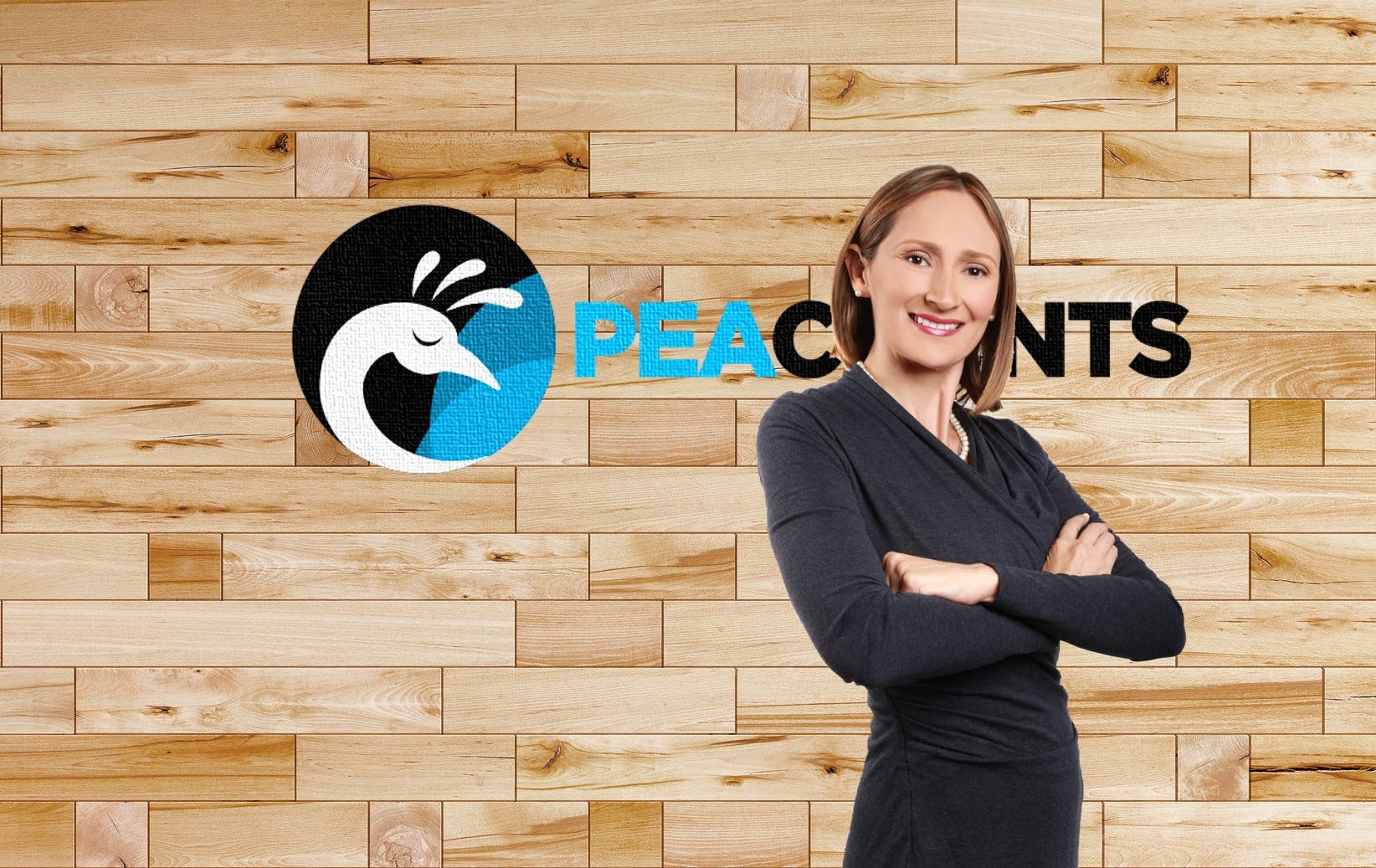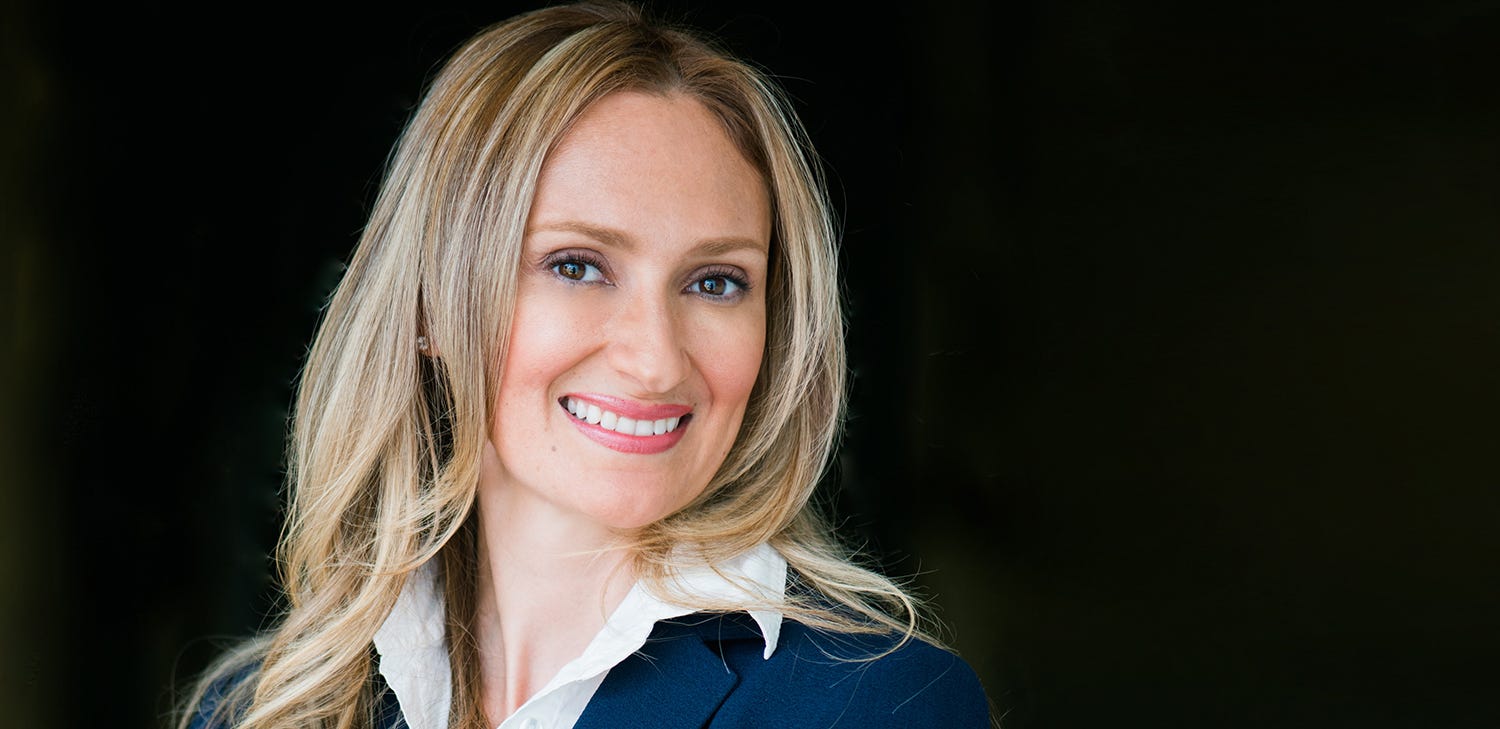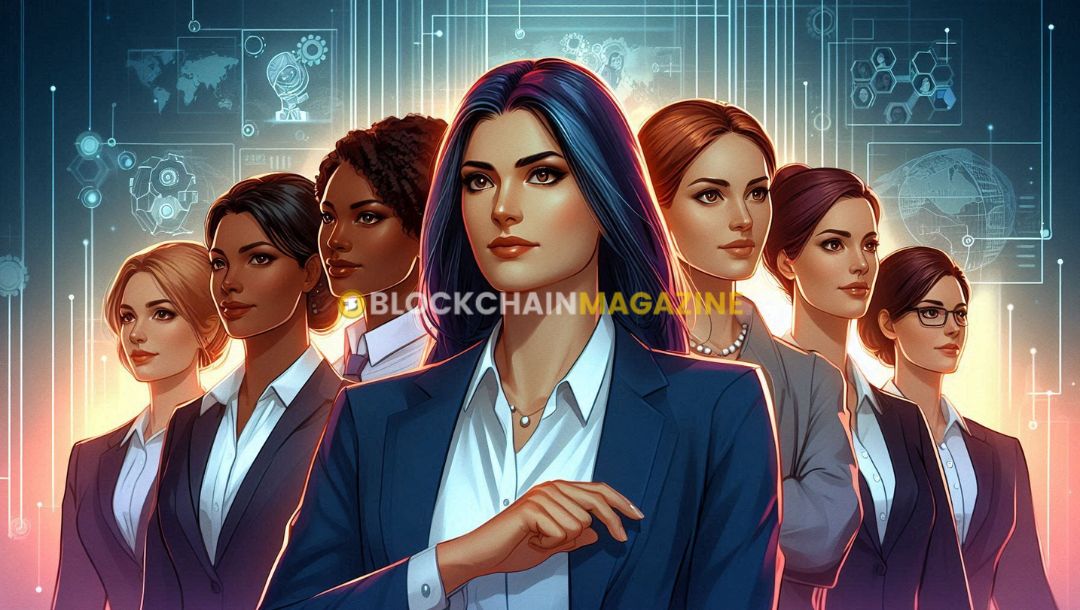“Beware Of The Potential For A Single Currency” 13 Insider Tips With Crystal Stranger, Co-Founder Of PeaCounts
Crystal Stranger: “ I personally don’t think this will ever happen, but the idea of just one currency, even a decentralized one, terrifies me. Every network has some form of consensus used for validating transactions, but there is always a potential even with a very simple system like Bitcoin that control of the technology could be vested in the hands of those using it for their own benefit against the masses. As long as we have multiple choices there will be less risk of this.”
I had the pleasure of interviewing Crystal Stranger, co-founder of PeaCounts. Author of The Small Business Tax Guide (Clear Advantage, 2014), Crystal wanted to help her tax clients who struggled when it came to bookkeeping. Looking to help entrepreneurs focus on business instead of finances, she co-founded PeaCounts, an accounting software using AI and blockchain. Peacounts was created to be the easiest automated accounting platform for small businesses by providing a simple and intuitive bookkeeping system that improves the financial system of any small business, helping to save time and money. PeaCounts is creating a trustless payroll system for businesses using the token PEA with an ICO starting in July.
Thank you so much for doing this with us! What is your “backstory”?’
I would say my life went full circle but was really more of a wild squiggly line. I hitchhiked to San Francisco at 15, mainly because Jerry Garcia died and I couldn’t find a ride anywhere else. I ended up liking the crazy energy of the city and settling there, then ended up studying Unix and early C++ coding back in the late 90’s. I tried launching a couple silly internet companies back then but got caught at the wrong time when the first dot-com boom went bust. Meanwhile, I had gotten into drag racing up at Sear’s Point in Sonoma and realized the people at the track who had the time and money to be successful racers all either owned businesses or real estate. So since I had tried and failed at businesses I decided to try real estate. I read every book in the SF library on real estate investment, worked three jobs as a tow truck driver, bartender, and hospitality for bands, lived in a travel trailer on the street in Hunter’s Point to save money and then leveraged my money through stock investing after 9/11. All this out of determination to buy my first house, which I purchased on 2/22/2002. Of course, this happened to be very lucky timing as the real estate market was just starting to go crazy, so I started buying more houses. When I was going to sell some places I had tax questions, and even my dad who has a tax firm couldn’t answer, so I took a class on taxes at H&R Block, the ended up becoming an Enrolled Agent all in search of the information I needed to deal with complex tax issues. This led, after a few detours into film production and helicopter flying, to a quite respectable career as a tax supervisor at an international tax firm, where I’ve overseen thousands of expat tax returns for each of the last five years, as well as running my own small business firm on the side. There is a clear crossover between crypto and foreign tax, so I started writing articles on this subject back in 2014 and playing around with a Bitcoin account for my business where I bought a small amount of BTC. Unfortunately, nobody paid me in BTC for my services, and I closed out the account to simplify. I had originally been introduced to Bitcoin back in 2011, but it was really hard to buy it at that time, and I tried but the account never actually funded, and it just seemed like too much of a hassle. Last summer I realized that some of the same friends who had tried to get me into BTC in 2011 were super rich now from it, so I started playing around with crypto investments to see what I could do, and it was like an endless dive down the rabbit hole that led to writing a weekly column for CryptoWeek, as well as freelancing for other publications.
Can you tell me about the most interesting projects you are working on now?
Last spring my brilliant co-founder at PeaCounts, Shashank Shukla, approached me with the idea of making an accounting system that automated the process so the small business owner didn’t have to do any data entry or reconciliation. As a business owner who also has ten AirBnb properties as a side business, I only know too well how much of a hassle all the business requirements are to keep up with. And I have seen a lot of my clients suffer from this, some even closing businesses just because the paperwork side is too overwhelming. So we started development on PeaCounts, and the idea has grown from there into something really revolutionary. Right now I am very excited about the tokenized payroll system we are developing as I see it solving a big problem in the world. Think about a construction company that hires day labor from the black market. From working with construction company clients I can tell you this isn’t because they want to, every owner I know is terrified of this. It just is because it is so difficult to add people to payroll for one day. With PeaCounts payroll the employee can fill out all the HR forms in just a couple minutes on a mobile app, then they go to work, and they get direct deposit of funds at the end of the day. Meanwhile, the underlying system is doing a lot of work. We use a smart contract to verify the identity and information, then our AI enters all the data into the tax forms, and it is secure so even the employer doesn’t have access to this to prevent identity theft. Then the money for the labor for the day is held in our PEA token so that both employer and employee are protected that the work will get done and the employee will get paid. We can use geofencing to track that the employee really stays on the job site all day, or whatever other requirements are there in the smart contract. Then at the end of the day when the conditions are met, the employee gets paid. The benefits of this are huge for all parties as it protects the employee as they are covered under workers comp and unemployment insurance, the employer is protected from lawsuits and tax troubles, and the government is protected by increasing income reported for taxes.
None of us are able to achieve success without some help along the way. Is there a particular person who you are grateful towards who helped get you to where you are? Can you share a story about that?
I couldn’t be where I am without my co-founder Shashank. PeaCounts just never would have happened. He was so perseverant in getting me to join forces with him, even though I turned him down at least a half-dozen times. Shashank was just so sure that with my tech and tax background I was the only person to build this with, and his enthusiasm was infectious. Sure he is a great leader for the dev team and has been instrumental in raising the money to get us this far, but more than that he is a good friend and has been there to support me through every moment of doubt.
What are the 5 things that most excite you about blockchain and crypto? Why?
1. Trustless transactions- it is amazing to me that we are entering a world where we can use digital ledgers and smart contracts to take away a lot of the need to trust that others will do what they say. This can have such an impact on reducing theft and people taking advantage of one another.
2. Archival of information- that you can create something on a blockchain hash that will be there for all eternity. This makes me think of when time capsules are opened fifty years later and there are a bunch of things in there but no reason why this was important. With blockchain, we can protect the why for generations to come.
3. Liquidity of Assets- the beautiful thing about ICOs is that the investor has a liquid market right away that they can be able to leave their investment at will. This secondary market liquidity allows for more funding of innovative new products, leading us to a technological revolution.
4. End of the Black Market- surely up until now Bitcoin has earned a bad rep as being used by hackers and drug dealers. But most cryptocurrencies actually are very trackable and this same technology can be used to find and stop illegal activities.
5. Fueling Innovation- there are so many new companies starting up in this space now that are actually creating new types of businesses. It has changed since 2017 where it was “how do we have an ICO to get investors on board” to a feeling of “how do we tokenize a process to make a significant social change” This shift in focus makes me really happy, and I really hope to see many of these socially responsible projects succeed.
What are the 5 things worry you about blockchain and crypto? Why?
1. Identity Used for Social Credit- that Black Mirror episode about the star ranking of social credit really terrified me as I see that possibility being very real through blockchain technology. That whole thing teachers used to say of “this will go down on your permanent record” actually can be real now. I think this type of system would stifle humanity’s creativity, and that terrifies me.
2. The potential for a Single Currency- I personally don’t think this will ever happen, but the idea of just one currency, even a decentralized one, terrifies me. Every network has some form of consensus used for validating transactions, but there is always a potential even with a very simple system like Bitcoin that control of the technology could be vested in the hands of those using it for their own benefit against the masses. As long as we have multiple choices there will be less risk of this.
3. Consolidation- there is no clear process yet of what will happen during the consolidation of the token markets. When we get to a time where blockchain companies are having M&As it will be unclear what will happen to the tokens of the acquired company. In certain areas like travel rewards and B2C payments, there are a large number of companies issuing ICOs, and this consolidation is inevitable.
4. Lack of Experience- I’ve met a number of people running ICOs that have zero experience in the industry they are entering. Sure in a few cases this may work out, but it also can lead to a lot of expensive mistakes. My mom went to RISD and one quote from a teacher of hers always stood out: “Art school is to learn the rules so you can know how to break them.” I think you have to understand the box and why it is there, at least to some degree, before building outside the box.
5. Extreme Cheerleading- some people are so extremely pro crypto that it terrifies me. I’ve been through the dot-com and the housing bubble and I don’t think the crypto market is anywhere near the top yet, but I do hear the enthusiasm potential for a huge over-enthusiasm that loses track of reality down the line. If you consider there is 96 Trillion invested worldwide in stocks and bonds if just one percent of that money enters the crypto market that is 960 Billion coming into the market. This would quadruple where it is today. And I think more like 2–5% is likely over the next five years. When this happens a lot more people will think they are smart just from having the luck of good timing, leading to unwarranted cheerleading. The moon/lambo thing now, that is just the tip of the iceberg.

How have you used your success to bring goodness to the world? Can you share a story?
I’ve done a lot of volunteer work speaking for business organizations like the SBA to help entrepreneurs know how to start a business. My big concern is a ton of jobs are disappearing right now with AI and robotics. I don’t think it will be the big firing and replacement with robots, this is happening slowly already as a few employees quit and a few more self-checkout stands are added. When we hit an economic contraction in some years from now, as is inevitable, then the out of work will have no fall-back job options. At that time a number of people will start businesses just out of necessity, and with PeaCounts we will be there to give them the tools to run their business without needing accounting or financial knowledge and make it easy to hire others. I want to see us live in a world like the Jetsons where we have comfortable lives with robots helping us, rather than the Hunger Games where human life is valued so little. This is what keeps me going out to conferences and talking with people to build a market for PeaCounts. I had a comfortable life and career, and I have two beautiful daughters aged between four and 16 months that I miss dearly while building the company. But being able to help make this transition to a new world easier for people down the line makes it all worth it.
What 3 things would you advise to someone who wanted to emulate your career? Can you share an example for each idea?
1. Follow your heart. Sometimes it isn’t clear in advance how the experiences you had will help you down the line. And then it comes a time where everything you have learned and experienced in very different activities comes into play and is needed. When I started flying helicopters I didn’t see any way this would fit in with my objectives, but this led to a job at a helicopter company as Director of Marketing, and the skills I learned there have helped me a ton with launching businesses later.
2. Avoid toxic people. Life is too precious to waste it on negative people, and it sucks, but sometimes you have to say goodbye to a group of friends in order to make new friends who share the bigger ideas and want great things for this world. In San Francisco, I was heavily in the punk music scene, but a lot of the people in that scene had ideas that if you were successful it was because you were a “sell out.” I came to the realization one day that only a few of the people I knew were really friends and supported me, and the rest who I had spent large amounts of time with really could care less. It was a painful realization, but opened me up to new experiences and forming new friendships with people who have helped me grow and succeed.
3. Make decisions. I think a lot of people never succeed because they never start. I remember a friend of mine years ago who used to be Madonna’s personal assistant say that she attributed her success to making decisions quickly, and that not every decision turned out well, but then she would make new decisions quickly to fix that. I try to be open and say “yes” to opportunities before I figure out if it really works or not. This has opened the door to many wonderful experiences that have shaped who I am and helped me be successful time and again.

Some of the biggest names in Business, VC funding, Sports, and Entertainment read this column. Is there a person in the world, or in the US whom you would love to have a private breakfast or lunch with, and why? He or she might just see this :-)
I would love to have lunch with Sophia the Robot. I guess that would be a little one-sided as she can’t eat lunch, but I would love to hear her opinion on the timeline for robots and AI displacing human jobs, and if she foresees impacts that I have yet to think about. I also would love to hear her opinion on how blockchain benefits AI, and pick her brain about the benefits there as I can see some aspects that I haven’t heard others mention and I would love to hear the opinion on this from the standpoint of a very advanced AI.
Stay informed with daily updates from Blockchain Magazine on Google News. Click here to follow us and mark as favorite: [Blockchain Magazine on Google News].
Get Blockchain Insights In Inbox
Stay ahead of the curve with expert analysis and market updates.
latest from tech
Disclaimer: Any post shared by a third-party agency are sponsored and Blockchain Magazine has no views on any such posts. The views and opinions expressed in this post are those of the clients and do not necessarily reflect the official policy or position of Blockchain Magazine. The information provided in this post is for informational purposes only and should not be considered as financial, investment, or professional advice. Blockchain Magazine does not endorse or promote any specific products, services, or companies mentioned in this posts. Readers are encouraged to conduct their own research and consult with a qualified professional before making any financial decisions. The featured image used is just a creative depiction of the title and it does not intend to hurt sentiments of any person or institution. If it hurts anyone sentiments, please do not hesitate to reach out to Blockchain Magazine.

 Bitcoin
Bitcoin  Ethereum
Ethereum  XRP
XRP  Tether
Tether  Solana
Solana  USDC
USDC  Dogecoin
Dogecoin  Cardano
Cardano  Lido Staked Ether
Lido Staked Ether  TRON
TRON  Wrapped Bitcoin
Wrapped Bitcoin  Chainlink
Chainlink  Wrapped stETH
Wrapped stETH  Avalanche
Avalanche  Sui
Sui  Stellar
Stellar  Litecoin
Litecoin  Toncoin
Toncoin  Shiba Inu
Shiba Inu  Hedera
Hedera  LEO Token
LEO Token  USDS
USDS  Hyperliquid
Hyperliquid  Polkadot
Polkadot  WETH
WETH  MANTRA
MANTRA  Bitcoin Cash
Bitcoin Cash  Bitget Token
Bitget Token  Ethena USDe
Ethena USDe  Wrapped eETH
Wrapped eETH  Uniswap
Uniswap  Monero
Monero  NEAR Protocol
NEAR Protocol  Pepe
Pepe  WhiteBIT Coin
WhiteBIT Coin  Aave
Aave  Bittensor
Bittensor  Ondo
Ondo  Aptos
Aptos  Internet Computer
Internet Computer  Dai
Dai  Official Trump
Official Trump  Ethereum Classic
Ethereum Classic  Mantle
Mantle  Tokenize Xchange
Tokenize Xchange  OKB
OKB  Gate
Gate  sUSDS
sUSDS  Sonic (prev. FTM)
Sonic (prev. FTM) 




